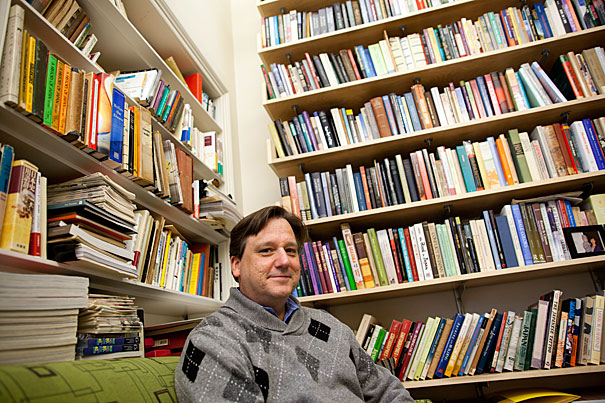
A convergence of factors led David Howell to studying Japan. For one, he was born there. (His father worked for the U.S. military.) For another, after age 10, Howell grew up in Hawaii, where the theaters on weekdays screened Japanese B-movies — gangster, comedy, and samurai flicks that awoke in him a sense of the culture.
Stephanie Mitchell/Harvard Staff Photographer
Finding Japan, through its past
Scholar focuses on cultural practices with an Eastern focus
Studying early modern Japanese history may not sound like a delight. After all, you have to learn the language, along with several archaic variants.
But David Luke Howell, Harvard’s newest professor of Japanese history, not only has made Japan’s Tokugawa period (1603-1868) a life’s work, he has managed to use it to explore some offbeat cultural sidelights. Those include night soil, matchlock firearms, disgruntled samurai, and 19th century hairstyle reform.
Regarding that last item, Howell — a writer of uncommonly witty and clear academic prose — recently penned an essay called “The Girl with the Horse-Dung Hairdo.” (The dung was what the piled-up hairstyle resembled.)
Within a couple of years, Howell promises a slim, playful volume on the subject of night soil, a human fertilizer no longer in favor, but which in premodern Japan was a powerful economic and even scientific preoccupation. (He has read — yes — many 19th century books on fertilizer practices.) At the same time, his more grave and major research interest involves investigating the fear of violence and social disorder in the period leading up to the Meiji Restoration of 1868.
The restoration was Japan’s pivotal moment. It revived an ancient imperial tradition, banished the feudal regime of the Tokugawa shogunate, and sent Japan hurdling into modernity. Howell likes to quote the British Japanologist Basil Hall Chamberlain (1850-1935), who witnessed the transformation. Japan went from a seeming Middle Ages to an era “full of talk about bicycles and bacilli,” said Chamberlain. “Old things pass away between a night and a morning.”
That friction point between old and new Japan captivates Howell, who earned his Ph.D. in 1989 at Princeton University, where he taught from 1993 until last year.
But Japan escaped being swallowed up by colonial powers. “A lot of their more aggressive energies were focused on China,” Howell said, and there were other distractions, like the American Civil War, the Franco-Prussian War, and an emergent, powerful Germany.
Japan also progressed readily from its feudal shell because there was a ready substitute for the Tokugawa shogunate, an imperial infrastructure that had survived as a weakened remnant of ancient Japan. Howell said that imperial power “was open for people to interpret as they chose.” The emperor’s focusing presence became an explicit machine for achieving modernity quickly.
But nostalgia for the Tokugawa period persists in Japan, said Howell, and to Western observers attracted to this feudal time of roaming samurai, relative peace, and stable social hierarchies. The era seemed to engender the elegant simplicity and the playful, artistic culture of today.
Studying Japanese history makes sense for three reasons, said Howell, who also teaches at Harvard Extension School. Japan is the world’s third-largest economy. Also, “people, as a general principle, should be literate about different parts of the world.” But mostly, said Howell, studying the Japan of the 17th through the 19th centuries exposes students to the idea “that there are lots of perfectly reasonable ways to run a society.”
Japan in the early modern era, after all, was safe, orderly, and hygienic. “If you had to choose a place to live in 1800, or almost anytime before antibiotics, you would not do bad choosing Japan,” he said.
Yet that Japan operated on a vastly different cultural logic. It was a world in which “it was a matter of common sense that all people are created unequal,” said Howell, “and that the purpose of law was to maintain order rather than the pursuit of justice as an abstract principle.”
A convergence of factors led Howell to studying Japan. For one, he was born there. (His father worked for the U.S. military.) For another, after age 10, Howell grew up in Hawaii, where the theaters on weekdays screened Japanese B-movies — gangster, comedy, and samurai flicks that awoke in him a sense of the culture.
What sealed Howell’s academic fate was the nearly four years he spent in Tokyo right after high school, going there with his family the first year. (His father, by then a Berkeley-trained sociolinguist, took the family with him on sabbatical.) “I fell in love with Tokyo almost immediately,” said Howell. He studied academic subjects in English at Sophia University, took a drumbeat of Japanese language courses, stayed on after his parents left, and reluctantly returned home to finish his bachelor’s degree at the University of Hawai’i at Hilo.
Until early in graduate school, Howell’s passion outside of Japanese history was bridge. Now he’s content to follow baseball, and to pursue a related quest: to visit all 30 major league stadiums with his teenage son. “Eight to go,” he said.




